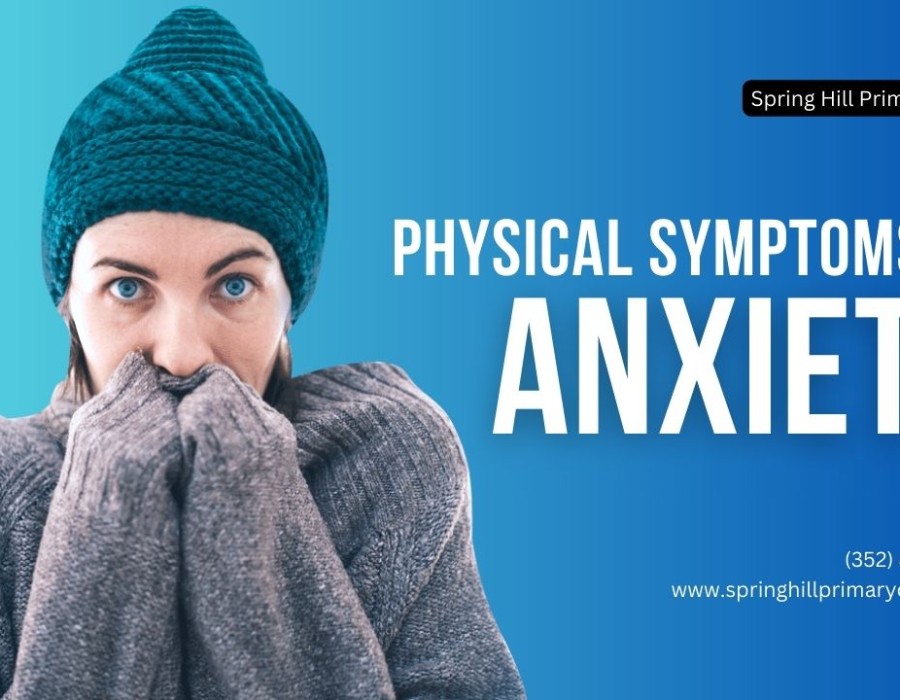Anxiety is a natural response to stress, but when it becomes overwhelming, it can trigger various physical symptoms that may feel alarming. Many people experiencing an anxiety attack often mistake their symptoms for a heart attack or another serious medical condition. Understanding the physical symptoms of anxiety can help you recognize when anxiety is the cause and how to manage it effectively.
At Springhill Primary Care, we are committed to helping patients in Spring Hill, Brooksville, Hudson, Homosassa, and Port Richey, FL, manage their mental and physical health. In this article, we’ll discuss the most common physical symptoms of anxiety attacks, particularly in females, and how they can impact your daily life.
Common Physical Symptoms of Anxiety
Anxiety doesn’t just affect the mind — it can have a significant impact on your body as well. Here are some of the most common physical symptoms:
1. Rapid Heartbeat (Palpitations)
During an anxiety attack, your body’s “fight or flight” response is activated, causing your heart rate to increase. This can lead to sensations of chest tightness, palpitations, or even dizziness, making it feel similar to a heart attack.
2. Shortness of Breath
Many people experiencing an anxiety attack feel like they can’t catch their breath or that their throat is tightening. This can lead to hyperventilation, which may make symptoms worse.
3. Muscle Tension and Pain
Muscle tension and pain are common symptoms of chronic anxiety. Prolonged stress causes your muscles to remain tight, leading to headaches, back pain, and overall body aches. Many people with anxiety unknowingly clench their jaw or tighten their shoulders, which can worsen discomfort.
4. Dizziness or Lightheadedness
Anxiety can affect your body’s circulation, leading to feelings of dizziness, weakness, or even faintness. If anxiety is severe, it may feel as though you’re going to pass out.
5. Gastrointestinal Issues
Anxiety is closely linked to the gut, often leading to symptoms such as:
- Nausea
- Diarrhea or constipation
- Stomach pain or cramping
- Many individuals with anxiety experience irritable bowel syndrome (IBS) or other digestive issues due to prolonged stress.
6. Sweating and Hot Flashes
Excessive sweating, chills, and hot flashes are common during an anxiety attack. This occurs because your body’s nervous system is in overdrive, preparing you for a perceived threat.
7. Tingling or Numbness
Anxiety can cause tingling sensations in the hands, feet, or face. This is due to hyperventilation and changes in blood circulation that occur during high-stress moments.
Anxiety Attack Symptoms in Females
While both men and women experience anxiety, some symptoms may be more common or pronounced in females due to hormonal fluctuations. These symptoms may include:
- Increased heart rate and palpitations
- Hot flashes or chills
- More frequent muscle tension and pain
- Excessive fatigue or insomnia
- Digestive issues (nausea, bloating, or stomach pain)
Women may also experience anxiety-related chest pain, which can feel similar to heart attack symptoms. If you are unsure whether your symptoms are anxiety-related or something more serious, seek medical attention immediately.
Managing Physical Symptoms of Anxiety
If you frequently experience these physical symptoms, there are ways to manage them:
1. Practice Deep Breathing
Controlled breathing exercises can help calm the nervous system and reduce shortness of breath, dizziness, and heart palpitations. Try inhaling deeply for four seconds, holding for four seconds, and exhaling for four seconds.
2. Engage in Regular Exercise
Physical activity can help relieve muscle tension and pain while boosting mood-enhancing endorphins. Activities like yoga, walking, and stretching are especially effective.
3. Reduce Caffeine and Sugar Intake
Excess caffeine and sugar can worsen anxiety symptoms, leading to increased heart rate and jitteriness. Opt for herbal teas and whole foods to maintain balance.
4. Try Relaxation Techniques
Meditation, mindfulness, and progressive muscle relaxation can help reduce tension and promote overall well-being.
5. Seek Professional Help
If your anxiety attack symptoms are interfering with your daily life, it may be time to seek professional support. At Springhill Primary Care, we offer compassionate care for patients in Spring Hill, Brooksville, Hudson, Homosassa, and Port Richey, FL.
When to See a Doctor
While anxiety symptoms can be managed, it’s important to rule out any underlying medical conditions that may be causing similar symptoms. Seek medical attention if you experience:
- Severe chest pain
- Shortness of breath that doesn’t improve
- Frequent dizziness or fainting
- Unexplained weight loss
- Persistent muscle tension and pain
Our team at Springhill Primary Care can help determine the cause of your symptoms and create a personalized treatment plan.
Get Anxiety Support at Springhill Primary Care
If you or a loved one is struggling with the physical symptoms of anxiety, you’re not alone. At Springhill Primary Care, we provide comprehensive care to help manage anxiety-related symptoms and improve your overall well-being.
📍 Serving Spring Hill, Brooksville, Hudson, Homosassa, and Port Richey, FL.
👉 Schedule an appointment today and take the first step toward better health.
📞 Call: (352) 835–7155





Comments